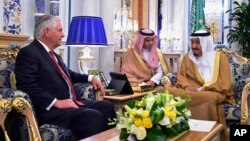U.S. Secretary of State Rex Tillerson returns to Doha Thursday to meet with the emir of Qatar, Sheikh Bin Hamad Al-Thani, the latest step in a round of shuttle diplomacy aimed at resolving a standoff between Qatar and a group that includes Saudi Arabia, the United Arab Emirates, Bahrain and Egypt.
The Saudi-led group accuses Qatar of supporting terrorism and has given Doha a 13-point list of demands after severing diplomatic ties in early June. Qatar has said it is willing to negotiate but will not give up its sovereignty.
Tillerson met with ministers from the Saudi-led group Wednesday in Jeddah, but did not speak to reporters afterward. Before the talks, a senior UAE official said any resolution of the conflict must go beyond terrorism financing and address all key issues.
After an earlier meeting this week with Qatari Foreign Minister Mohammed bin Abdulrahman al-Thani, Tillerson announced the United States and Qatar signed a memorandum of understanding for Doha to take steps to curb terrorism financing.
But the Saudi-led group said in a statement that while they appreciate U.S. counterterror efforts, the agreement signed Tuesday “is not enough” and they will be closely monitoring Qatar’s “seriousness” in combating the funding and support of terrorism.
Brokering a crisis
The U.S. is concerned the dispute could hurt its military and counterterrorism operations and enhance Iran’s influence in the region. Qatar hosts the largest U.S. military facility in the Middle East, which aircraft from the U.S.-led coalition use to launch attacks against Islamic State militants in Iraq and Syria.
Aaron David Miller of the Washington-based Wilson Center, an adviser to both Republican and Democratic secretaries of state in Middle East negotiations, told VOA the conflict with Qatar and Saudi Arabia and its allies has been brewing for years, saying in many ways, Qatar’s open domestic policies embody Saudi Arabia’s worst fears and amount to competing views of the shape of the Middle East. He said it would be very difficult for Tillerson, or anyone else, to help broker a long-term agreement.
Amnesty International issues warning
As Tillerson shuttled through the Gulf, the international human rights group Amnesty International called on the secretary to not overlook the issue of human rights and advocate for the release of activists being detained in Gulf states for “peacefully expressing dissent.”
“While Secretary Tillerson holds talks with the leaders of Saudi Arabia and other Gulf countries, human rights defenders are in prison and face torture for speaking out against horrific abuses in the region,” said Naureen Shah, senior director of campaigns at Amnesty International USA.
“Tillerson should condemn the persecution of peaceful dissidents, many who are facing bogus national security charges. Otherwise, Tillerson risks giving Gulf governments a green light to continue ruthless crackdowns on dissent.”





